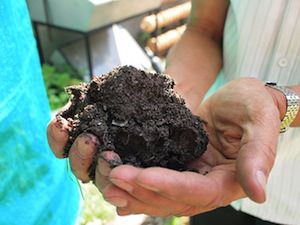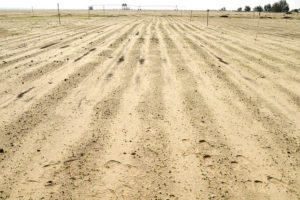Photosynthesis Could Be a Climate Change Solution
Researchers say "one of the most common [biological] processes on Earth" is also "one of the most promising means of extracting atmospheric carbon dioxide" on a scale potentially large enough to reduce the risk of catastrophic global warming.
Researchers say “one of the most common [biological] processes on Earth” is also “one of the most promising means of extracting atmospheric carbon dioxide” on a scale potentially large enough to reduce the risk of catastrophic global warming.
The key substance is called biochar. “Biochar … is basically a fancy scientific name for charcoal [and] is produced when plant matter—tree leaves, branches and roots, cornstalks, rice husks, peanut shells—or other organic material is heated in a low-oxygen environment,” writes Mark Hertsgaard at Mother Jones. “Like compost, all of these materials contain carbon: The plants inhaled it, as carbon dioxide, in the process of photosynthesis. Inserting biochar in soil therefore has the effect of removing carbon dioxide from the atmosphere and storing it underground, where it will not contribute to global warming for hundreds of years.”
— Posted by Alexander Reed Kelly.
Your support matters…Mark Hertsgaard at Mother Jones:
Johannes Lehmann, a professor of agricultural science at Cornell, is one of the world’s foremost experts on biochar. He has calculated that if biochar were added to 10 percent of global cropland, it would store 29 billion tons of carbon dioxide equivalent—an amount roughly equal to humanity’s annual greenhouse gas emissions. This approach would take advantage of a physical reality often overlooked in climate policy discussions: the capacity of the Earth’s plants and soils to serve as a climate “sink,” absorbing carbon that otherwise would be released into the atmosphere and accelerate global warming. Oceans have been the most important sink to date, but their absorption of CO2 is acidifying the sea—threatening the marine food chain—and raising water temperatures, which is causing sea levels to rise (because warm water expands). Meanwhile, the Earth’s plants and soils already hold three times as much carbon as the atmosphere does, and scientists believe that they could hold a great deal more without upsetting the balance of natural systems.
Independent journalism is under threat and overshadowed by heavily funded mainstream media.
You can help level the playing field. Become a member.
Your tax-deductible contribution keeps us digging beneath the headlines to give you thought-provoking, investigative reporting and analysis that unearths what's really happening- without compromise.
Give today to support our courageous, independent journalists.






You need to be a supporter to comment.
There are currently no responses to this article.
Be the first to respond.